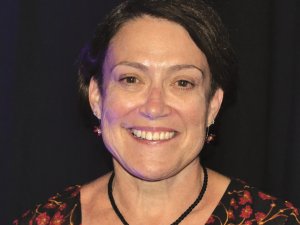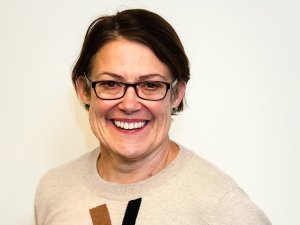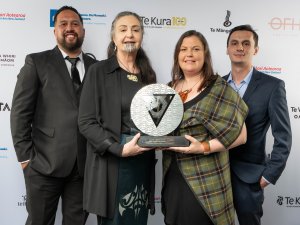Respiratory physician Lutz Beckert considers chronic obstructive pulmonary disease management, including the prevention of COPD, the importance of smoking cessation and pulmonary rehabilitation, and the lifesaving potential of addressing treatable traits. He also discusses the logic of inhaler therapy, moving from single therapy to dual and triple therapy when indicated, as well as other aspects of management
Sue Crengle: Calling to account
Sue Crengle: Calling to account

Virginia McMillan reports on the rise of a specialist GP with mana
Sue is a force of nature. I have no idea how she manages to do all of the things that she does
When young GP-in-training Nikki Turner kissed a kuia as part of welcoming her into a consultation, her GP trainer called the action sexually inappropriate.
Dr Turner’s colleague, Sue Crengle, was outraged. “So off I trot and express my displeasure” at a meeting of the RNZCGP board, Professor Crengle said, in her inaugural professorial lecture at the University of Otago earlier this year.
“I don’t think it made much difference,” she added. Not long after that “first foray into the college of GPs”, she joined the Auckland faculty board; she would go on to serve on the full college board between 2015 and 2020 and become a distinguished Fellow.
In the early 1990s, Drs Crengle and Turner were “green”. Still, they set to work establishing a health service for the west Auckland-based Waipareira Trust.
“I had done 18 months in general practice,” Professor Crengle told her inaugural lecture audiences on campus and online.
The new service didn’t go down well with some of the local GPs. One of them, Peter Woolford, “really supported us and continues to be a very dear friend”, Professor Crengle says.
Dr Woolford is still out west – clinical director at Health New Lynn – and travelled to Dunedin for the address. University vice-chancellor David Murdoch introduced Professor Crengle, saying her humble nature belies a hugely impressive CV.
Being appointed to the board of Te Aka Whai Ora is “an absolute testament to Sue’s mana”, Professor Murdoch says.
Emma Wyeth, health sciences associate dean Māori, followed up by calling Professor Crengle a politically engaged intellectual.
Patricia Priest, acting pro-vice-chancellor health sciences, summed up at the end: “Sue is a force of nature. I have no idea how she manages to do all of the things that she does in teaching and research, service to Māori, to health, to the university and to the country, not to mention as a clinician.”
Professor Crengle was appointed as a professor early last year, but her celebratory lecture was COVID-delayed. She has been laden with honours in recent times.
This year, Te Ohu Rata o Aotearoa – Māori Medical Practitioners Association bestowed their Dr Maarire Goodall Award.
The Youth2000 team, on which she is an investigator, won a University of Auckland Research Impact Award. Last year, the work of the Māori pandemic group Te Rōpū Whakakaupapa Urutā was celebrated when Māori Television gave it the Matariki Supreme Award; Professor Crengle is a member.
Professor Crengle (Kāi Tahu, Kāti Māmoe, Waitaha) set out in her lecture to dispel notions that Māori are reluctant to take part in research, are difficult to recruit to research, and are difficult to retain in research projects.
It was just as well she didn’t attempt an overview of her academic output. That includes at least 19 research grants received as principal or joint principal investigator and dozens more as researcher; 136 published articles (and counting) in refereed journals; and 40 papers on which she contributed, including last year’s review into Pharmac and annual reports of the Perinatal and Maternal Mortality Review Committee
She completed RNZCGP fellowship in 1997, was awarded a Master in Public Health in 1998 with a thesis on Well Child services at Waipareira, and spent 1999/2000 as a Harkness Fellow at Johns Hopkins University in Baltimore, US.
A year at the National Health Committee confirmed she didn’t want to be a bureaucrat. She took up a senior lectureship in medicine at her alma mater, the University of Auckland, and held a Health Research Council Māori health research fellowship.
Settling into the university for much of the 2000s, she eventually returned to general practice at Turuki Healthcare in south Auckland. But not before she had completed a PhD in 2008 on management of children’s asthma in primary care and had gained fellowship of the New Zealand College of Public Health Medicine.
Professor Crengle next had a stint in planning and funding as a part-time clinical advisor to Waitematā and Auckland DHBs.
Although originating in Southland, her family had moved often when she was young so she was familiar with Auckland and Wellington, but headed to home turf in 2014 to be a GP and clinical lead at Invercargill Medical Centre. She now works there one day a week.
On the university website, she describes herself as a senior Māori health researcher with a particular focus on health inequities, health services research and quality of care, and youth health. She’s co-director with Dr Wyeth of the Ngāi Tahu Māori Health Research Centre.
BILLBOARD
WIN password-free access to New Zealand Doctor Rata Aotearoa for your general practice
Click here to find out how
This month, under-management of asthma in Māori and Pacific children was revealed in prescribing data presented by clinical education programme He Ako Hiringa. It was an echo – one-and-a-half decades later – of Professor Crengle’s PhD and subsequent study reports.
Prior to the thesis, she had already put on record the poor state of asthma care for Māori, contributing the asthma chapter to Hauora: Māori Standards of Health IV, published in November 2007 and covering 2000 to 2005.
This pointed to Māori deaths from asthma as a political issue in the 1990s. An inquiry ordered by then Māori affairs minister Koro Wetere found plenty of undertreatment and urged education that is appropriate, effective and acceptable for Māori.
Her later PhD research found Māori and Pacific children in New Zealand had higher morbidity and greater severity of asthma; almost all went to primary care for their asthma. They had more hospital and emergency department attendances; were less likely to be shown how inhalers work, get information about triggers or receive an asthma plan; and their general knowledge of asthma was lower. Their use of nebulisers was not accompanied by greater levels of care.
He Ako Hiringa’s analysis still shows ethnicity as a factor in lower rates of preventive medication dispensed. For example, of the Pacific people who were dispensed SABA in the last 12 months, 55 per cent were given SABA alone, compared with 42 per cent of European/Other.
A significant proportion (13.5 per cent) of Māori and Pacific people who were dispensed six or more SABA inhalers in a year were given no maintenance therapy.
There is no reason to be only on a short-acting beta-agonist these days,” Professor Crengle tells New Zealand Doctor Rata Aotearoa.
She says: “I think there has probably been some improvement but it is really disappointing to see persisting inequity.”
She sees it as a sign primary care has not embedded quality improvement in its model.
Subconscious bias in the consultation appears to be involved and, she says, is more likely to arise in the kinds of high-stress, time-pressured situations typical of general practice. It can lead to lower-quality education and prescribing – “and most of us would have no idea and would be horrified” to realise it.
“This is where clinical audit comes into play, where you can identify what is happening and do something about it,” Professor Crengle says.
Being benchmarked against their peers helps doctors change their behaviour, she says, adding He Ako Hiringa data are of high quality and are useful for motivation.
When inequities are embedded in how health professionals always do things, because of that unconscious bias under pressure, “unless you actually proactively think about what you doing, you will get the same outcome”, she says.
Professor Crengle adds she hopes Te Whatu Ora will prioritise supporting primary care to deliver better outcomes for conditions such as asthma that drive hospital visits and admissions.
“Ambulatory-sensitive hospitalisations cost the Government a lot of money and, by definition, are responsive to high-quality primary care.”
Professor Crengle described in her lecture how her asthma research team had included a diverse range of door-knockers and interviewers, and ensured the experience was culturally safe for participants, who would be interviewed by someone who matched their ethnicity. They would also receive a koha.
Outlining two others of her major research projects, on the “polypill” and lung cancer screening, Professor Crengle showed what made these successful in recruiting and retaining Māori participants.
People are happy to participate if they see it as an important issue for them, she says. Research subjects are also positive about the study staff “if you have the right people engaging”. Non-Māori staff who are supportive make a difference.
The lung cancer team, for example, follows a Māori kaupapa and an equity focus, and has “an absolute commitment” to ensuring lung cancer screening works for Māori.
Professor Crengle says co-design is used; the team has substantial Māori leadership and support; the majority of staff interacting with participants are Māori; and tikanga and appropriate protocols and processes are used. Almost 90 per cent of the 126 eligible people chose to be involved with the study.
Ending her lecture, Professor Crengle gave special mention to her late father, Bryan, who had lung cancer.
We're publishing this article as a FREE READ so it is FREE to read and EASY to share more widely. Please support us and the hard work of our journalists by clicking here and subscribing to our publication and website









![Barbara Fountain, editor of New Zealand Doctor Rata Aotearoa, and Paul Hutchison, GP and senior medical clinician at Tāmaki Health [Image: Simon Maude]](/sites/default/files/styles/thumbnail_cropped_100/public/2025-03/Barbara%20Fountain%2C%20editor%20of%20New%20Zealand%20Doctor%20Rata%20Aotearoa%2C%20and%20Paul%20Hutchison%2C%20GP%20and%20senior%20medical%20clinician%20at%20T%C4%81maki%20Health%20CR%20Simon%20Maude.jpg?itok=-HbQ1EYA)
![Lori Peters, NP and advanced health improvement practitioner at Mahitahi Hauora, and Jasper Nacilla, NP at The Terrace Medical Centre in Wellington [Image: Simon Maude]](/sites/default/files/styles/thumbnail_cropped_100/public/2025-03/2.%20Lori%20Peters%2C%20NP%20and%20advanced%20HIP%20at%20Mahitahi%20Hauora%2C%20and%20Jasper%20Nacilla%2C%20NP%20at%20The%20Terrace%20Medical%20Centre%20in%20Wellington%20CR%20Simon%20Maude.jpg?itok=sUfbsSF1)
![Ministry of Social Development health and disability coordinator Liz Williams, regional health advisors Mary Mojel and Larah Takarangi, and health and disability coordinators Rebecca Staunton and Myint Than Htut [Image: Simon Maude]](/sites/default/files/styles/thumbnail_cropped_100/public/2025-03/3.%20Ministry%20of%20Social%20Development%27s%20Liz%20Williams%2C%20Mary%20Mojel%2C%20Larah%20Takarangi%2C%20Rebecca%20Staunton%20and%20Myint%20Than%20Htut%20CR%20Simon%20Maude.jpg?itok=9ceOujzC)
![Locum GP Helen Fisher, with Te Kuiti Medical Centre NP Bridget Woodney [Image: Simon Maude]](/sites/default/files/styles/thumbnail_cropped_100/public/2025-03/4.%20Locum%20GP%20Helen%20Fisher%2C%20with%20Te%20Kuiti%20Medical%20Centre%20NP%20Bridget%20Woodney%20CR%20Simon%20Maude.jpg?itok=TJeODetm)
![Ruby Faulkner, GPEP2, with David Small, GPEP3 from The Doctors Greenmeadows in Napier [Image: Simon Maude]](/sites/default/files/styles/thumbnail_cropped_100/public/2025-03/5.%20Ruby%20Faulkner%2C%20GPEP2%2C%20with%20David%20Small%2C%20GPEP3%20from%20The%20Doctors%20Greenmeadows%20in%20Napier%20CR%20Simon%20Maude.jpg?itok=B0u4wsIs)
![Rochelle Langton and Libby Thomas, marketing advisors at the Medical Protection Society [Image: Simon Maude]](/sites/default/files/styles/thumbnail_cropped_100/public/2025-03/6.%20Rochelle%20Langton%20and%20Libby%20Thomas%2C%20marketing%20advisors%20at%20the%20Medical%20Protection%20Society%20CR%20Simon%20Maude.jpg?itok=r52_Cf74)
![Specialist GP Lucy Gibberd, medical advisor at MPS, and Zara Bolam, urgent-care specialist at The Nest Health Centre in Inglewood [Image: Simon Maude]](/sites/default/files/styles/thumbnail_cropped_100/public/2025-03/7.%20Specialist%20GP%20Lucy%20Gibberd%2C%20medical%20advisor%20at%20MPS%2C%20and%20Zara%20Bolam%2C%20urgent-care%20specialist%20at%20The%20Nest%20Health%20Centre%20in%20Inglewood%20CR%20Simon%20Maude.jpg?itok=z8eVoBU3)
![Olivia Blackmore and Trudee Sharp, NPs at Gore Health Centre, and Gaylene Hastie, NP at Queenstown Medical Centre [Image: Simon Maude]](/sites/default/files/styles/thumbnail_cropped_100/public/2025-03/8.%20Olivia%20Blackmore%20and%20Trudee%20Sharp%2C%20NPs%20at%20Gore%20Health%20Centre%2C%20and%20Gaylene%20Hastie%2C%20NP%20at%20Queenstown%20Medical%20Centre%20CR%20Simon%20Maude.jpg?itok=Z6u9d0XH)
![Mary Toloa, specialist GP at Porirua and Union Community Health Service in Wellington, Mara Coler, clinical pharmacist at Tū Ora Compass Health, and Bhavna Mistry, specialist GP at Porirua and Union Community Health Service [Image: Simon Maude]](/sites/default/files/styles/thumbnail_cropped_100/public/2025-03/9.%20Mary%20Toloa%2C%20Porirua%20and%20Union%20Community%20Health%20Service%20in%20Wellington%2C%20Mara%20Coler%2C%20T%C5%AB%20Ora%20Compass%20Health%2C%20and%20Bhavna%20Mistry%2C%20PUCHS%20CR%20Simon%20Maude.jpg?itok=kpChr0cc)